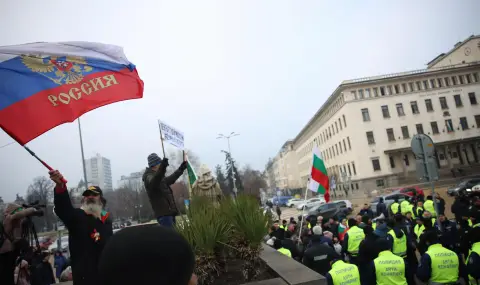Comment by Veselin Stoynev:
In a world that is radically changing with each passing day, Bulgaria timidly looked around, trying to find the corner of a promise. However, the question is not only whether this attitude is unworthy in the new global order of harsh realism. But whether there is any common sense in lowering the bar until the storm passes. Because until and if it passes at all soon, we may find ourselves like a cat that thinks it has hidden well in a box where no one sees it, but which has been imperceptibly swept away into the water.
Downsizing as a political mentality
The policy of downsizing is actually not a strategic policy, but a national political mentality and instinct. It has its centuries-old melancholic root in the experience of the national catastrophe after the Treaty of Neuilly. It has its mythical root in the deep national Russophilia, in which the pocket is turned to the West, and the heart pulls to the East. It has its national psychological root that irresistibly whispers – don't try to win, because everyone wants to screw you.
All of this is also tied up in the current internal political knot. Political representation at all institutional levels – parliament, government, president, is incapable of following a unified foreign policy strategy. The president and the speaker of the parliament are for Russian peace, the prime minister is declaratively with Ukraine, the foreign minister has the authority of a party intern, the chairman of the parliamentary foreign affairs committee is the former mayor of the capital, with even weaker foreign policy competence, and the leader of the largest party, usually boasting about his personal contacts with world leaders, has hidden behind a door through which no one insists on entering anyway.
Bulgaria has twice missed the chance to sit at the table with the majority of European countries, which are urgently resolving the issue of the war in Ukraine and their own threatened security. Many of the uninvited got angry and most were invited a second time, only Bulgaria did not even timidly raise its hand to ask "why not me".
Tactical gap between the EU and the US
For the regular meeting of the European Council on March 6, in which we are entitled to participate, we finally remembered that we needed to prepare some homework. And the Prime Minister convened the Government Security Council, effectively turning it into an Advisory Council on National Security (which is under the President) with the inclusion of the leaders of the parliamentary groups. This was a good place to formulate a common political position of the country for the summit and for some beginning of a national political strategy in the new situation. Alas, for now it is expressed in the laconic credo "we cannot choose between the US and the EU". Something like an echo of Tsar Boris's "always with Germany, never against Russia".
And the problem is not in the stride, but in the delay that the tactic of continuous listening offers, so as not to make the wrong choice. Because the question is not to choose between one parent and the other, but to take care together with your family of the security of your own home – the European Union.
With the money for rearmament, it should not become like with the PVP
Bulgaria will at least declaratively join von der Leyen's plan for 800 billion euros for rearmament, but this money is its own funds and loans and it is unlikely to be a great enthusiast. If we do not have the energy and management capacity to seriously participate in joint defense projects with other European countries and to initiate such projects ourselves, we will continue on the well-trodden path of not absorbing the money under the Recovery and Resilience Plan. And as we drive on a semi-coupler on the European highway, constantly expecting a crossing ahead of us where Trump's train can take us, we quickly and imperceptibly remain on the second- and third-class road network. And driving there is no safer, and even less can it provide a catch-up speed for our development. Especially if it turns out that our careful look around deprives us of a decisive political push to enter the eurozone next year under the formal membership criteria that are on the scales.
The government seems to be internally incapable of more decisively positioning the country. The waiting gap, however, itself becomes an additional factor for its destabilization, because maintaining this position also counts in the battles and balances for power and business positions in the ruling coalition.
Can PP-DB and DPS-Dogan replace BSP and ITN in power?
A more categorical pro-European policy seems possible only with a reformatting of the government, in which the BSP and/or ITN leave it. However, this means that PP-DB and MRF-Dogan will become direct coalition partners of GERB. The prospect of this is almost incredible, at least because of the impossibility of PP-DB as a whole, and not just part of this coalition, to even think about such a prospect. Although now, as 3 years ago, a geopolitical basis for legitimizing a "assembly" appears.
Bulgaria's indecisive and wait-and-see foreign policy position, the result of internal political divisions and an inability to overcome narrow-party egos, is not just a self-deprivation of strategic depth, cutting off national horizons. It puts us at a gambling risk of following world events with surprise and with thoughtless ad hoc reactions that may have a fateful significance for the future. Even to the point of sharp political turns with unpredictable, accidental good or bad consequences.
